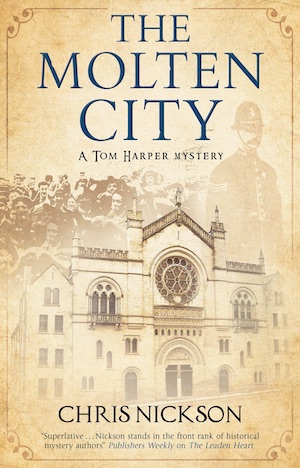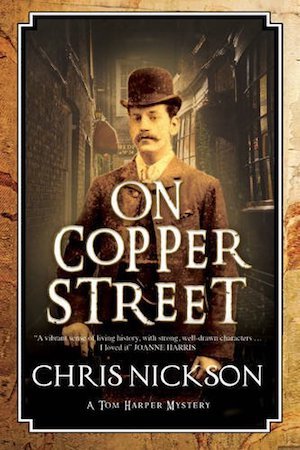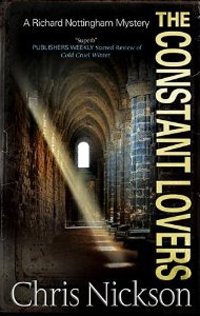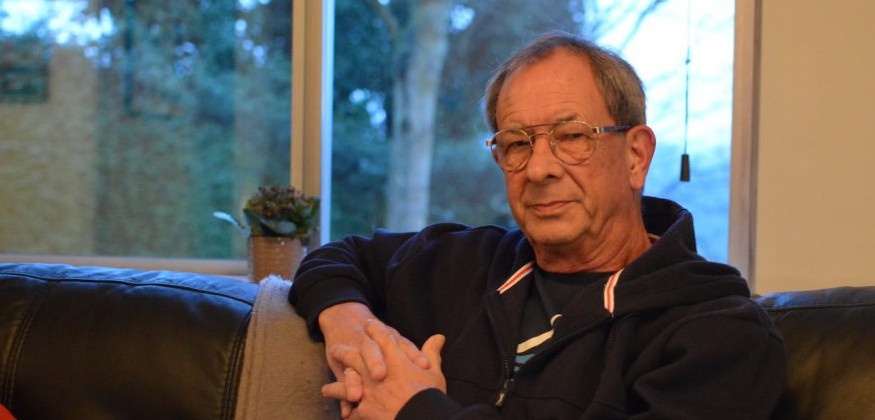Chris Nickson is celebrating 10 years of crime writing about Leeds with the publication of his 22nd novel, The Molten City, on 31 March. He has written a number of historical crime series set in different periods, and this one sees the return of Nickson’s Edwardian detective DS Tom Harper. Here, the author shares with us some of his thoughts on historical crime fiction, the pleasures of research, and his deep commitment to writing about his home city.
What are crime fiction lovers going to love about The Molten City?
All of it, I hope! Seriously, there’s the cold case mystery of a stolen child at the heart of the book, but also the strand of a riot by the suffragettes and the unemployed when the prime minister comes to Leeds, meaning Detective Superintendent Tom Harper and his men have to try and keep order.
It’s the
eighth book in the series, with the familiar characters back again. There’s
suspense, proper old-fashioned detection well, it is 1908, so the closest we
come to forensics is the very early days of fingerprints. We have a few dead
bodies, several dead ends, and a race to find the person behind it all. Hopefully
you won’t be able to guess who that is – and the whole thing will be thrilling.
I think that covers the highlights.

I’d finished
the writing before I realised that this has the theme of families. Some broken,
some solid, some yearning – that puts me very much in Ross MacDonald territory,
but set in Edwardian Leeds, not 1950s California. Yet some things never change,
of course, especially relationships.
Tom Harper feels like a very grounded character, and has a strong marriage. It’s quite a refreshing change from the dysfunctional detective. Was that a conscious decision?
When I started writing crime fiction with my Richard Nottingham series set in the 1730s, I made definite decisions. He would be married and have children. The loner detective who drinks too much is a very tired cliché. Most people are married, they have lives outside of work, worries with their partners and kids. That’s how the world is for most people. And by having scenes with the family, it rounds out a character; we see a different side of them. I’ve had one character who was single, Dan Markham in my 1950s books. But those are deliberately noir – and even then he had a regular, and very strong, girlfriend.
At the start of the Tom Harper series, in Gods of Gold, Tom was engaged. His marriage to Annabelle happened at the end of the book. A couple of years later they had a daughter who’s 16 years old in The Molten City and quite headstrong. But Annabelle herself is a strong, working-class woman. I like to have strong women as characters; there are plenty of them in the North, and certainly here in Leeds. And most women I’ve known have been strong. I’d have been hard-pressed to keep Annabelle out really. She insisted on having bigger and bigger roles in the books. She’s the emotional heart of the series. But she’s definitely not part of the police work.
Tom Harper’s wife Annabelle is a suffragist while their daughter is increasingly drawn to the suffragettes. The suffragettes are much better known now. Is that why you wanted to highlight both strands of the campaign for women’s votes?
That was a happy accident. In an earlier book in the series (Skin Like Silver, which takes place in 1893), Annabelle becomes converted to suffragism. In The Tin God, set in 1897, after women could stand for some local offices and all ratepayers could vote in local elections, she becomes a working-class woman running to be a Poor Law Guardian as a suffragist. The suffragettes didn’t even exist then. But Mary, the daughter, would inevitably be attracted by the deeds not words actions of the suffragettes. It was pure luck, but it created the kind of generational tension most parents know very well. It also gave me the chance to show both sides of pro-votes for women argument – the talk of the suffragists and the militancy of the suffragettes, which are a stark contrast. And Tom, of course, is a man stuck in the middle.

How do you go about researching your books?
Leeds history has been a passion of mine for years. That said, when I was young, I couldn’t wait to get away from here – but so many of us are like that, aren’t we? When I was 21 I moved to the US, but I’d come back annually to see my parents, and I started buying books about Leeds history. Once eBay started, I could find many more Leeds history books through that, even if the shipping was expensive. In 2005 I moved back to this country, and they all came with me. Since then I’ve acquired many more. I’m also a bit of a history buff in general terms. So I have the framework and some of the resources. We’re fortunate to have an excellent Family and History Library here, and also the Leeds Library, Britain’s oldest subscription library, which also houses material from the Thoresby Society, which is all local history. Between those and people who specialise in different issues, I’m able to look pretty fully into things. Part of the joy of writing historical crime fiction is the discovery of research.
You have to
be careful with what you learn, though. No information dumps, no lengthy
descriptions or exposition, just try to weave it in naturally, little strands
here and there. Layers of small things end up making a bigger, immersive
picture. And never include something purely for its own sake. It might be
clever, but if it doesn’t help the plot or the characters, it doesn’t belong. I
learned all that by trial and error!
One element of the plot in The Molten City touches on child snatching. How did you get this idea? Did it arise out of your research?
There were different kinds of child theft, there always have been, and still are. They happen for different reasons. There was nothing specific that sparked it in this book, though. It was more the idea of Harper receiving an anonymous letter and the police failings it exposed – or corruption, and the ripples it can cause. Back then, the police were very poorly paid, less than many workers. It was no surprise there were plenty of bent coppers.
How do you manage to be so prolific, especially when your books are so research-heavy?
People tell me I’m prolific, but honestly, it doesn’t feel that way to me. I write every day, but it’s only 1,000 words on a book. It all builds up, though. I was a journalist for a long time, which means I had to learn to get things down more or less right the first time, as tight deadlines don’t offer the freedom to keep revising. A book generally takes me four to five months from start to finish, which doesn’t seem incredibly speedy to me.
By now, the
overall research is easier. I know Leeds history, and working on a series means
I keep up my overall familiarity with a time period. So the research takes less
time that you might imagine, more on specific issues or years.
How does the research fit into your writing process?
Sometimes research will give me an idea for a plot thread or an incident. In The Molten City, the Suffragette Riot of 1908 formed the backdrop. I needed to exactly know what happened, who was involved, how many people, where the action happened, how it panned out, and then aftermath. I know a suffrage historian who was incredibly helpful, but there are other things – what motor cars were around at the time, how transport had changed, the new building that had gone on in the city. With the 20th century, life was speeding up, things were altering at a rapid pace, and I needed to get that right, too. So while my knowledge of the time is generally sound, it’s the details that require work. The more I know, the more confidently I can write.
The story incorporates the real-life visit of Herbert Asquith, the prime minister, to Leeds. How do you manage the trade-off between drama and accuracy?
As the saying goes, when the choice is truth and a good story, choose the story… Honestly, I try to be accurate where I can, although I will sometimes bend the truth. Several of the characters in The Molten City are real: Asquith and Gladstone, who was the Home Secretary. But they’re really just walk-ons. Jennie Baines, the suffragette organiser, was real enough, and has a meatier role. The same with Alf Kitson, who headed up the unemployed men. The Tom Harper books do have a heavy sprinkling of real people, more than the other series I’ve written, but much of that is due to the fact there several have a backdrop in local politics.
The suffrage historian I know has advised me on a couple of the books, and had plenty of background to the 1908 riot which is such an important part of this book – in fact, she’s put together an exhibition about it that will be on all April in the Family and History Library in Leeds. Having that information right there helps keep me honest, as it were.

You’ve written about a range of historical periods, from the 18th century through to the 1950s. Do you have a favourite period?
I realised the other day that I’ve set a book in every decade from the 1890s to the 1950s. I’ve achieved that goal, daft as it is. And in a twisted fashion, that’s a way of answering your question. To me, Leeds is a character in my books, evolving and changing over the years, yet someone immutably Leeds, and I love it. Chronicling the place and making people feel they’ve experience it is important to me. At my greediest, I want to live it all.
But… if I was really pressed, I’d say from 1890-1918, to see the world of the Harpers, and also what the city was like when my father was born. I’ll read about something that happened and think “Tom and Annabelle would have known that,” before I realise that no, they wouldn’t. They’re my creations, they never existed. Yet they’re as real to me as anyone I know. The series has turned into one that’s not just crime, but also about their family and its changes, and about Leeds itself, I think. It wasn’t deliberate, it seems to have happened that way!
What do you plan to write next?
I’m actually a few books ahead. I have a one featuring Simon Westow, the thief-taker in 1820s Leeds, coming out in the autumn, the third in that series, and another Tom Harper set for next spring – that one takes place in 1913, and heralds some very big changes for the all the Harper family. At the moment I’m working on yet another Simon Westow. I have plans for more of the Tom Harper series. Annabelle hasn’t finished with me yet!
I still do a
little music journalism, which was my living for 15 years. These days, though,
it’s just a few reviews to keep my hand in. The bottom has fallen out of that
in terms of trying to make money.
I’m also compiling a very brief history of Sheepscar, the area of Leeds where Tom and Annabelle lived. My great-grandfather ran the Victoria, Annabelle’s pub, for 20 years, and a couple of other ancestors lived in the area, so I have a personal connection. The houses were demolished in the 1960s as part of the slum clearance; it’s all light industry now. But no one’s ever written about it, to my amazement. I’m not a trained historian, but I’m enjoying hunting around from a ton of different sources. A fragment here, another there, then trying to piece them together over time.
I’ve been
publishing crime novels set in Leeds for 10 years now. It’s gone by in a flash.
The things that have happened because of it have astonished me. A couple of
plays involving my characters, one with a live jazz band. With the historian I
know, I helped to put together an exhibition called The Vote Before The Vote,
about the local Victorian women who worked towards the vote in the 19th
century. So much I’d never expected.
I’ve also just become the very first writer-in-residence for Abbey House Museum here. It can’t think of a better way to celebrate a decade of doing this. It’s a huge honour, one more thing I could never have imagined when The Broken Token came out in 2010.
Really, above all, I’m grateful that publishers still believe in my work and even more to the people who read it. And bonus points to those who enjoy it!
Read some of our reviews of Chris Nickson’s novels.
